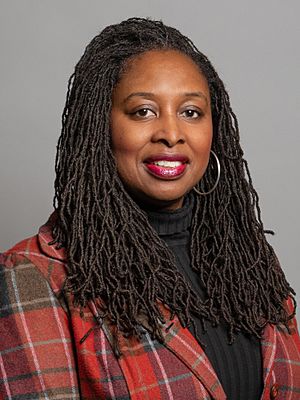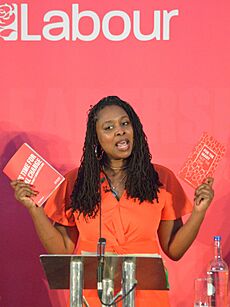Dawn Butler facts for kids
Quick facts for kids
Dawn Butler
|
|||||||||||||
|---|---|---|---|---|---|---|---|---|---|---|---|---|---|

Official portrait, 2020
|
|||||||||||||
| Parliamentary Secretary for the Cabinet Office | |||||||||||||
| In office 3 November 2009 – 11 May 2010 |
|||||||||||||
| Prime Minister | Gordon Brown | ||||||||||||
| Preceded by | Tom Watson | ||||||||||||
| Succeeded by | Caroline Nokes | ||||||||||||
| Minister for Young Citizens and Youth Engagement | |||||||||||||
| In office 30 October 2009 – 11 May 2010 |
|||||||||||||
| Prime Minister | Gordon Brown | ||||||||||||
| Preceded by | Office established | ||||||||||||
| Succeeded by | Office abolished | ||||||||||||
|
|||||||||||||
| Member of Parliament for Brent East Brent Central (2015–2024) |
|||||||||||||
| Assumed office 7 May 2015 |
|||||||||||||
| Preceded by | Sarah Teather | ||||||||||||
| Majority | 13,047 (34.5%) | ||||||||||||
| Member of Parliament for Brent South |
|||||||||||||
| In office 5 May 2005 – 12 April 2010 |
|||||||||||||
| Preceded by | Paul Boateng | ||||||||||||
| Succeeded by | Constituency abolished | ||||||||||||
| Personal details | |||||||||||||
| Born |
Dawn Petula Butler
3 November 1969 Forest Gate, London, England |
||||||||||||
| Political party | Labour | ||||||||||||
| Other political affiliations |
Socialist Campaign Group | ||||||||||||
Dawn Petula Butler (born 3 November 1969) is a British politician for the Labour Party. She is the Member of Parliament (MP) for the Brent East area. An MP represents the people of their local area, called a constituency, in the House of Commons. Before this, she was the MP for Brent Central from 2015 to 2024 and for Brent South from 2005 to 2010.
Born in London to parents who came from Jamaica, Butler worked for a trade union before she entered politics. She also worked as an adviser to the mayor of London, Ken Livingstone. In 2005, she was elected as the MP for Brent South.
From 2009 to 2010, she served in Prime Minister Gordon Brown's government in roles focused on young people. When she was an MP for Brent Central, she became a close supporter of Jeremy Corbyn, who was the leader of the Labour Party at the time.
Butler was later given important roles in the Shadow Cabinet. This is a team of politicians from the main opposition party who "shadow" the government ministers. She was the Shadow Secretary of State for Women and Equalities. In 2020, she ran to become the deputy leader of the Labour Party but was not elected. The new Labour leader, Keir Starmer, did not include her in his new Shadow Cabinet, and she returned to being a backbench MP.
Contents
Early Life and Career
Dawn Petula Butler was born in Forest Gate, an area in East London. Her parents, Milo and Ambrozene Butler, had moved to England from Jamaica. She has one sister and four brothers.
She went to Tom Hood School in Leytonstone and Waltham Forest College. Before becoming a politician, she worked for the GMB Union, where she was a national officer for race and equality. She also advised London's mayor, Ken Livingstone, on jobs and social issues.
First Term as an MP (2005–2010)
Butler first tried to become a Labour candidate for Parliament in other London areas but was not chosen. She was then selected for Brent South after the previous MP, Paul Boateng, retired. She won the 2005 general election and became the MP for that area. She was the third black woman to become a British MP, following Diane Abbott and Oona King.
Work in Parliament
As an MP, Butler was very interested in services for young people. In 2006, she became the head of a parliamentary group on youth affairs. When Gordon Brown became prime minister in 2007, he made Butler a vice chair of the Labour Party, with a special focus on youth issues.
In December 2009, Butler became the first black woman to speak from the despatch box in the House of Commons as a government minister. The despatch box is the table in front of the government and opposition benches where ministers and shadow ministers stand to speak.
Boundary Changes
Before the 2010 general election, the map of constituencies was changed. Butler's constituency of Brent South was removed. Most of it was split into two new areas: Brent Central and a new version of Brent North.
Butler ran for the new Brent Central seat but lost to Sarah Teather of the Liberal Democrats. After leaving Parliament, she worked on creating training programs for companies.
Second Term as an MP (2015–Present)
In 2013, Butler was chosen again as the Labour candidate for Brent Central. In the 2015 general election, she won the seat and returned to Parliament.
Supporting Jeremy Corbyn
In the 2015 Labour leadership election, Butler supported Andy Burnham. However, she also lent her official support to Jeremy Corbyn to make sure his name was on the ballot paper for members to vote on.
After Corbyn was re-elected as Labour leader in 2016, he appointed Butler as the Shadow Minister for Black and Minority Ethnic Communities.
Joining the Shadow Cabinet
In February 2017, Butler resigned from her role to vote against the government's plan to start the Brexit process. Labour MPs had been told to vote for the plan. However, she returned to her role a few months later.
In August 2017, she was promoted to the Shadow Cabinet as the Shadow Secretary of State for Women and Equalities. In this role, she spoke for the Labour Party on issues of fairness and equality.
2020 Deputy Leadership Election
After the 2019 general election, Butler announced she would run to be the deputy leader of the Labour Party. She was seen as a close ally of Jeremy Corbyn. She came in fifth place out of five candidates. Angela Rayner won the election.
Return to the Backbenches
When Keir Starmer became the new Labour leader in 2020, he chose a new Shadow Cabinet, and Butler was not included. She returned to being a backbench MP, which means she is not a government minister or a shadow minister.
In July 2020, Butler had to close her constituency office. She said this was due to rising costs and because of threats made against her and her staff.
In August 2020, Butler said she was stopped by police while in a car in Hackney. The police officers believed the car was registered in another part of the country. They later admitted it was a mistake and apologised. Butler said the experience was an example of unfair treatment.
On 22 July 2021, Butler was told to leave the House of Commons for the rest of the day. This happened after she said that Prime Minister Boris Johnson had lied to Parliament and refused to take back her words.
In the 2024 United Kingdom general election, she was re-elected as the MP for the newly created constituency of Brent East.
Personal Life
Butler was diagnosed with breast cancer in December 2021. She had an operation called a mastectomy as part of her treatment.
 | Janet Taylor Pickett |
 | Synthia Saint James |
 | Howardena Pindell |
 | Faith Ringgold |


